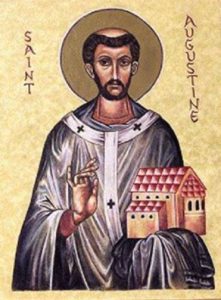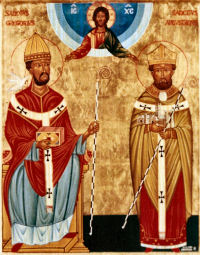
27 May
St Augustine of Canterbury (-604)
Bishop
Born: early 6th century, probably in Italy
Died: probably 26 May 604, Canterbury, Kent, England
Venerated in: Anglicanism, Catholic Church, Eastern Orthodox Church
Canonized: Pre-Congregation
Patron: England.
St. Augustine was born in Rome and died in Canterbury, England, in 604. When Pope Gregory I heard that the pagans of Britain were disposed to accept the Catholic Faith, he sent the prior of St. Andrew, Augustine, and forty of his Benedictine brethren to England. Despite the great difficulties involved in the task assigned to him, Augustine and his monks obeyed. The success of their preaching was immediate. King Ethelbert was baptized on Pentecost Sunday, 596, and the greater part of the nobles and people soon followed his example. St. Augustine died as the first Archbishop of Canterbury. His feast is celebrated in the Extraordinary Form on May 28.
COLLECT PRAYER
O God, who by the preaching of the Bishop Saint Augustine of Canterbury led the English peoples to the Gospel, grant, we pray, that the fruits of his labors may remain ever abundant in your Church. Through our Lord Jesus Christ, your Son, who lives and reigns with you in the unity of the Holy Spirit, God, for ever and ever.
Things to Do:
- Pope Gregory brought the faith to different countries by sending groups of missionaries. Consider how you can help the missions, either monetarily or spiritually.
- St. Augustine has been called “Apostle of England” because of his missionary efforts. Pray to him today that England will return to the one true Faith.
- Visit “The Apostle to the English”
- Watch this video on the life of St. Augustine of Canterbury
- Read the Catholic Encyclopedia’s account of the Life of St. Augustine

St. Augustine of Canterbury
St. Augustine was the agent of a greater man than himself, Pope St. Gregory the Great. In Gregory’s time, except for the Irish monks, missionary activity was unknown in the western Church, and it is Gregory’s glory to have revived it. He decided to begin with a mission to the pagan English, for they had cut off the Christian Celts from the rest of Christendom. The time was favorable for a mission since the ruler of the whole of southern England, Ethelbert of Kent, had married a Christian wife and had received a Gaulish bishop at his court. Gregory himself wished to come to Britain, but his election as pope put an end to any such idea, and in 596 he decided to send an Italian monk following the comparatively new Rule of St Benedict. Augustine set out with some companions, but when they reached southern Gaul a crisis occurred and Augustine was sent back to the pope for help. In reply the pope made Augustine their abbot and subjected the rest of the party to him in all things, and with this authority Augustine successfully reached England in 597, landing in Kent on the Isle of Thanet. Ethelbert and the men of Kent refused to accept Christianity at first, although an ancient British church dedicated to St Martin was restored for Augustine’s use; but very shortly afterwards Ethelbert was baptized and, the pope having been consulted, a plan was prepared for the removal of the chief see from Canterbury to London and the establishment of another province at York. Events prevented either of these projects from being fulfilled, but the progress of the mission was continuous until Augustine’s death, somewhere between 604 and 609.
The only defeat Augustine met with after he came to England was in his attempt to reconcile the Welsh Christians, to persuade them to adopt the Roman custom of reckoning the date of Easter, to correct certain minor irregularities of rite and to submit to his authority. Augustine met the leaders of the Welsh church in conference but he unfavorably impressed them by remaining seated when they came into his presence — it is likely that in this he unfavorably impressed St Bede too. Augustine was neither the most heroic of missionaries, nor the most tactful, but he did a great work, and he was one of the very few men in Gaul or Italy who, at that time, was prepared to give up everything to preach the gospel in a far country.
— Excerpted from The Saints edited by John Coulson
Source: Catholic Culture